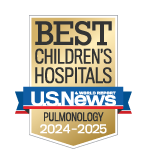Immunology Clinic
Nationally ranked by U.S. News & World Report

The Immunology Clinic at Children’s Mercy provides care for children with primary immunodeficiency disorders—a group of rare conditions where the immune system is not working well at fighting infections. The most common symptom of an immunodeficiency disorder is recurrent infections but can also include autoimmune concerns, cancers, and allergic issues.
Nationally ranked by U.S. News & World Report
Nationally ranked by U.S. News & World Report
-
Diagnostic testing for primary immunodeficiencies
-
Treatment for primary immunodeficiencies
-
Immunoglobulin infusions (IVIG) or subcutaneous infusions
-
Biological medications
-
Recommendation for evaluation by stem cell transplant team
Conditions
-
Antibody deficiencies such as agammaglobulinemia, common variable immunodeficiency, specific antibody deficiency, selective IgA deficiency, hypogammaglobulinemia
-
Severe Combined Immunodeficiency Syndrome (SCID)
-
Combined immunodeficiencies, including hyper IgM syndrome, hyper IgE syndrome, Wiskott Aldrich syndrome
-
Phagocytic disorders including chronic granulomatous disease, leukocyte adhesion defect
-
Complement deficiency
-
Autoinflammatory disorders including periodic fever syndromes
-
Immune dysregulatory disorders
-
Innate immune defects
Immunologic conditions in newborns
All newborn babies are screened at birth for several different genetic health conditions. In every state, including Missouri and Kansas, the screening now includes a test for severe combined immunodeficiency syndrome, or SCID.
A baby with SCID does not have the immune cells they need to fight infections. Adding a test for Severe Combined Immunodeficiency Syndrome (SCID) to the standard newborn health screening has greatly increased the number of babies who are diagnosed early in life with this rare condition. This means that many babies with severe immunodeficiencies can begin treatment before they get sick and continue to lead healthy, active lives.
The newborn screening test is designed to be extra sensitive to make sure no one is missed. If your baby tests positive during the newborn screening process, you will be referred to a specialist, like the immunologists at Children’s Mercy, for additional, more specific testing.
For many babies, the additional testing comes back negative, and there is no cause for concern. If your baby does test positive for SCID, we can immediately begin the process of treating them. Once treated with a bone marrow transplant, most kids go on to lead a healthy childhood.
Immunologic conditions in older children
Immunologic conditions can arise at any age. Often, the first sign is recurring infections that raise concerns for parents or primary care providers.
The immunology team at Children’s Mercy will help you identify the next steps to diagnose and treat your child’s condition. We may have you keep track of symptoms, such as fevers, over a period of time, or undergo additional testing to determine the cause of your child’s illnesses.
What to expect
When you come to the immunology clinic, we will work with your family to gather a complete medical history and physical exam, order necessary tests, and provide a diagnosis and treatment plan that works for you.
Often, bloodwork, including genetic testing, helps us understand your child’s condition. We have a kid-friendly lab on-site to help make testing as quick and comfortable as possible for your child.
Continued care as your child grows
Children’s Mercy provides comprehensive care for your child. We will work collaboratively with any other specialists your child needs, including pulmonology, hematology, rheumatology, dermatology, and others.
We will continue to see your child in the immunology clinic on a regular basis to ensure they are staying as healthy as possible. In their teenage years, we will help them begin the process of learning how to manage their own health care and transition to adult care.
Advancing research for children with immunodeficiencies
The Children’s Mercy Immunology team participate in research projects to improve the lives of children with immunodeficiency disorders. We have a representative on the state task force for newborn screening in both Missouri and Kansas.
Learn more about immunological conditions
Families often find these resources valuable to help them understand their child’s condition: